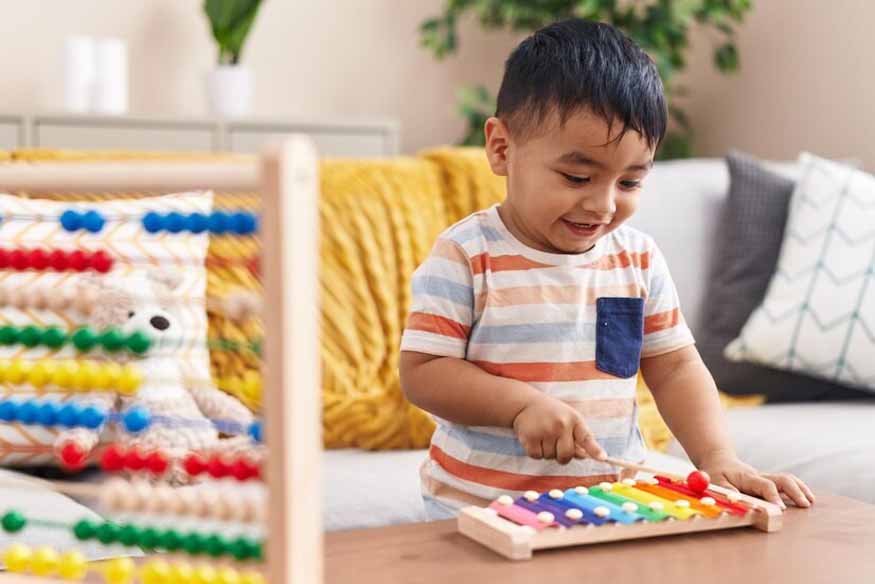Kindergarten contributes significantly to your child’s overall development. It helps your kid develop the social capabilities, emotional capacity, literacy, and fine motor abilities that they will need throughout their lives. During this time, a kid learns by using their senses of hearing, sight, smell, and touch. For example, a child’s sense of touch teaches them about different forms and sizes of objects; hearing teaches them how to listen and understand the world around them; and sight teaches them how to recognise objects, patterns, and words. Children learn how to think, understand objects and language, and express themselves through a variety of activities in kindergarten, including dance, music, painting, and games.
Sending your child to kindergarten is crucial for their future growth and development. Children who are admitted to kindergarten classes have superior cognitive skills, higher IQs, a better understanding of the world around them, improved social connections, and a deeper love of learning. Children who have a sound learning foundation are more likely to develop efficient thought processes and be overall smarter.
It’s that time of the year again when parents who have kids in kindergarten age are confused. And that’s because you now have to decide in which grade you need to enroll your toddler. Nursery is typically categorized as pre-kindergarten and Junior Kg / Lower Kg or Senior Kg / Upper Kg which fall under kindergarten.
What is the ideal kindergarten age and what is the best pre-kg age?
As per the NEP (National Education Policy 2020), below is the kindergarten age guide or classification: This table shows the pre-kg age, junior kg age, and nursery school age.
Level | Age | Grade |
Pre-kindergarten | 3-4 years | Nursery |
Kindergarten | 4-5 years | Junior Kg |
Kindergarten | 5-6 years | Senior Kg |
However, in India, the age at which children begin kindergarten can vary depending on the school and the state. Apart from age, there are more important factors that should guide your decision because it will determine her lifelong educational journey. Kindergarten is the foundation for a healthy school life where your child continues to develop a wide range of skills, including physical, social, emotional, language and literacy, and thinking (cognitive) skills, making it crucial to consider the overall environment and curriculum offered by the school.
Here are some general recommendations to help you decide when your child is ready for kindergarten, i.e. figuring out the right kindergarten age
Is your child physically & emotionally ready?
Feels obvious, right? Yes, a child’s physical and emotional development has to be considered first! Don’t you think that a child should be able to sit in a place for at least short periods to be able to pay attention to whatever the teacher says? That is a marker for pre-kg age! Children should also be able to follow simple instructions, whether at home or in school. Not only that, they should also be able to communicate their needs and express themselves verbally to a decent extent.
Interacting with peers is not essential but yes, the child should be comfortable with kids of the same age around her. Do you think your child fits the bill? Check if your child is ready for these things. If not, then it may be best to wait for a while before enrolling him or her in preschool.
Is your child ready for academic learning?

Another important factor to consider is the child’s readiness for academic learning. While kindergarten is not considered to be a formal academic setting, children should have some basic skills before starting. These include being able to identify and name basic shapes and colors, count to 10, and recognize their name. At kindergarten age, we believe that a child should have basic knowledge of the alphabet and be able to recognize a few letters.
Be updated about your state’s kindergarten-age criteria
The age guide for kindergarten enrollment in India is typically between the ages of 3 and 4. Not only for kindergarten, pre- kg age, junior kg age, nursery school age, and pre-nursery age should be followed. However, some schools may have different age requirements. Many times they meet the child and parent and depending on their interaction with the kid they propose the grade ideal for the child. It’s best to take the advice of these experts who work with children day in and day out.
Ask for a pre-joining session
Getting the child acclimatised to the new surroundings is important. To that end, enrol for a pre-joining session. Many schools like EuroKids offer tours or open houses for parents whose kids are around the kindergarten age. At such sessions, you can watch their child interact with other children and teachers. Your child’s reaction to the pre-joining session will give you a good idea as to how he or she would adjust to a school setting. It will also help the preschool teacher determine the level at which your kid can be enrolled or if she needs some more mental orientation at home.
Don’t be in a hurry
It’s natural. Every parent wants to be right on this one. Putting one year early or one year later might have its pros and cons. But just breathe. It’s OK. Remember that your child is unique and will develop only at his or her own pace. The world won’t come crashing down just in case your child is not quite ready for pre- kg age of 3 or 4. It just means that they need time because he or she is a unique individual. He or she may be ready a year later. Transition to school is difficult. So, a child needs to be ready both emotionally and academically.
Ask the medical expert
You should talk to a paediatrician or early childhood education expert if you have doubts about your child’s readiness for kindergarten. These professionals specialise in this subject. They interact with the child, give simple instructions, and based on their professional understanding and parameters can also provide valuable insight into a child’s readiness for preschool.
Enrolling your child in preschool can have many benefits. It can help them develop social skills, improve their language and communication abilities, and introduce them to basic academic concepts. It can also provide them with a structured and safe environment to learn and grow.
Remember while the statistical age guide can help you to an extent, no one can be a better kindergarten-age guide for your child other than you. Use the support system available to you to make the decision.
Yes, determining the appropriate kindergarten age for your child can be a tough process but at the end of the day, it is not rocket science. With the sincere and patient involvement of both parents, this complex and important decision can be tackled properly.
Take into account your child’s physical and emotional growth, as well as his or her preparation for school. Take time to meet other parents to understand the difficulties they faced when they admitted their kid a year early or a year late. But make sure that the decision is yours because no one knows your child like you. If you are confused or need help in determining the right kindergarten age or pre-kindergarten age for your child, professionals at EuroKids will be happy to guide you. All you need to do is to visit them at a EuroKids center near you.
For informative and accurate articles on all things related to your new born-toddler’s development, growth, health and nutrition, follow EuroKids Blogs and do check out our nationally recognized preschools – EuroKids for the first step in your kid’s educational journey!














